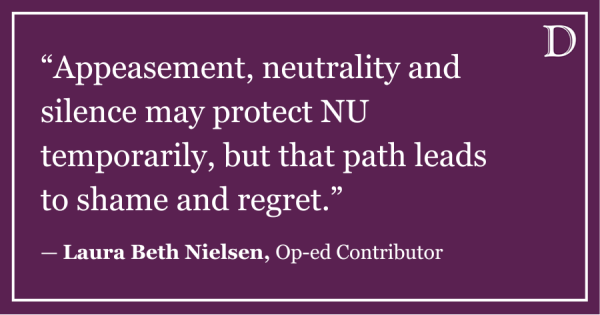LTE: What you need to know about monkeypox
Twenty-six gay and queer-identifying Northwestern faculty came together to address what they viewed as insufficiencies in the initial statement by NU officials regarding the Monkeypox outbreak. This situation is evolving, and the opinions represented in this story reflect the changing circumstances. These faculty represent many disciplines and demonstrate a concern for their students, especially queer and trans students.
Last month, the University shared information with students about the monkeypox virus, MPX. This message was careful not to stigmatize men who have sex with men, but was nonetheless inaccurate and misleading. When the administration claims “Monkeypox is not a sexually transmitted infection or disease, nor is it linked to sexual orientation,” it obscures the dominant mode of MPX transmission and fails to mention the group most at risk for MPX. We believe students need and deserve better information.
First, the evidence is clear that MPX is spreading overwhelmingly through sex, in as many as 95% of cases. Regardless of whether MPX is technically a sexually transmitted infection, MPX can be described as “sexually transmissible,” according to the Centers for Disease Control and Prevention. Think about it: the virus is primarily transmitted through close skin-to-skin contact, and sex is an activity that typically involves considerable skin-to-skin contact.
Second, cases of MPX are overwhelmingly concentrated among men who have sex with men and their sexual networks. Throughout the MPX outbreak, men who have sex with men have consistently accounted for more than 95% of cases. Trans people are also at elevated risk, particularly if they sleep with men who have sex with men, while cases among straight cisgender men, cisgender women and children remain very rare.
As gay male and queer-identified NU faculty members who also study and teach the history and culture of the HIV/AIDS epidemic, other public-health issues related to sex between men, and sexuality studies, we believe it is important for all students — but particularly male students who have sex with men, as well as trans students — to have clear information that will empower them to protect themselves.
Here are some concrete things you can do to reduce your risk of MPX:
First, seek the information you need. Chicago’s LGBTQ+ health organization, Howard Brown Health Center, has been a local leader in the efforts against MPX. They have posted very clear info on MPX transmission, vaccination, treatment and risk-reduction in English and Spanish. The Gender & Sexuality Studies program and Sexualities Project at Northwestern are also leading a first-week monkeypox info and impact session on Friday, Sept. 23 at 12:30 p.m. in Kresge 1515, open to all.
Second, get vaccinated for MPX as soon as possible! Vaccination is currently recommended for all sexually active men who have sex with men, as well as transgender people. We are pushing the University to offer voluntary MPX vaccines on campus, as it did with COVID-19. Meanwhile, vaccine appointments are available at Howard Brown Health Centers and across Chicago.
Third, consider some common sense behavioral changes to lower your risk of MPX. Reduce your number of new or casual sex partners, and don’t be afraid to have frank conversations with your partners about MPX risk. It is probably wise to avoid sex parties and sex clubs for now. Using condoms during sex is also a good idea, if not to prevent MPX transmission, then at least to prevent some of the most painful symptoms.
Consider these behavioral changes at least until you are fully vaccinated (meaning two weeks after your second dose of the vaccine), and maybe even for some time after. We do not know exactly how effective the vaccine will be under the conditions of the current outbreak.
Finally, monitor yourself for symptoms. Be on the lookout especially for any new rashes or blisters. If you suspect you may have MPX, avoid sex and other forms of skin-to-skin contact with others until you can get tested. For MPX testing and treatment, you can contact Student Health Services as the administration suggests, or you can visit one of the many Chicago locations of the Howard Brown Health Center.
In August, more than 20 gay male faculty members shared our concerns about the University’s MPX communications in a letter to Vice President for Operations Luke Figora and Student Health Services Director of Operations Anita Opdycke. We wish NU administrators had solicited expert faculty and responded less dismissively to earlier pleas for input. We hope the tide is now turning, as a revised, more complete MPX guidance will be forthcoming soon. In the meantime, as is so often in the past, queer community members are banding together to protect and educate one other.
Chad Horne, Assistant Professor of Instruction in Philosophy
Héctor Carrillo, Professor of Sociology and Gender & Sexuality Studies
Nick Davis, Associate Professor of English and Gender & Sexuality Studies
Steven Epstein, Professor of Sociology and John C. Shaffer Professor in the Humanities
Lane Fenrich, Charles Deering McCormick Distinguished Senior Lecturer of History and Gender & Sexuality Studies
Kyle Henry, Associate Professor of Radio/TV/Film
Jeffrey Masten, Professor of English and Gender & Sexuality Studies
Gregory Ward, Professor of Linguistics, Gender & Sexuality Studies, and, by courtesy, Philosophy
Marquis Bey, Assistant Professor of African American Studies and English
Brian Bouldrey, Senior Lecturer in English
Corey Byrnes, Associate Professor, Kaplan Humanities Institute and Asian Languages and Cultures
Ryan Dohoney, Associate Professor of Musicology
Matthieu Dupas, Assistant Professor of French
Jillana Enteen, Professor of Instruction in Gender & Sexuality Studies
Jesús Escobar, Professor of Art History
Douglas Foster, Professor of Journalism
Jay Grossman, Associate Professor of English
Leslie Harris, Professor of History
José Medina, Walter Dill Scott Professor of Philosophy
Brian Mustanski, Director, Institute for Sexual and Gender Minority Health and Wellbeing and Professor of Medical Social Sciences
Steve Reinke, Professor of Art, Theory, Practice
Melissa Rosenzweig, Assistant Professor of Instruction in Anthropology and Environmental Policy and Culture
Sarah Schulman, Professor of English
Steven Thrasher, Daniel Renberg Chair and Assistant Professor of Journalism
Mary Weismantel, Professor of Anthropology
Michał Wilczewski, Assistant Professor of Instruction in Slavic Languages and Literatures
If you would like to respond publicly to this op-ed, send a Letter to the Editor to opinion@dailynorthwestern.com. The views expressed in this piece do not necessarily reflect the views of all staff members of The Daily Northwestern.








